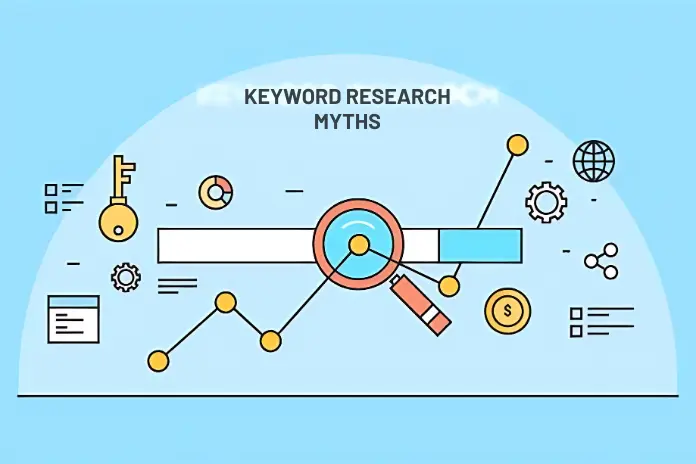Keyword research has long been a pillar of SEO strategy, but it’s also surrounded by outdated myths that can hinder growth. With Google’s evolving algorithms, AI advancements, and Search Generative Experience (SGE), old tactics no longer work.
So, what really matters in 2025? Let’s break down some of the biggest keyword research myths and explore the best practices that actually drive traffic and rankings today.

Myth #1: High Search Volume Keywords Are Always Better
Debunked: High-volume keywords often bring high competition and low conversions
It’s easy to assume that targeting the highest search volume keywords will bring in the most traffic. But in reality, broad keywords often:
Have intense competition (making it harder to rank)
Attract irrelevant traffic (users may not be ready to convert)
Lack clear intent (Are users looking for information, products, or services?)
What Works Instead?
Prioritize long-tail keywords and intent-driven queries. These keywords:
Are less competitive but highly targeted
Match user intent (informational, navigational, or transactional)
Drive higher conversion rates
Example:
Instead of “SEO services”, go for “affordable SEO services in Dubai for small businesses”.
📌 Pro Tip: Use Google’s People Also Ask and Autocomplete to find long-tail keywords that answer real user queries. As highlighted in this in-depth analysis, prioritizing searcher intent over sheer volume leads to more sustainable SEO success.
Myth #2: Exact Match Keywords Are Essential for Ranking
Debunked: Google’s NLP understands semantic search & user intent
Gone are the days when stuffing exact match keywords in every sentence helped rankings. Google’s AI now understands:
Synonyms & related terms
Topic relevance instead of single keyword placement
Context & intent, not just word-for-word matches
What Works Instead?
Use LSI (Latent Semantic Indexing) keywords naturally.
Focus on topic clusters and related terms rather than forcing exact matches.
Example:
Instead of repeating “SEO services Dubai” awkwardly, use variations like “SEO solutions for Dubai businesses”, “best SEO agencies in Dubai”, or “search engine optimization in UAE”.
📌 Pro Tip: Use tools like Google’s NLP API, Clearscope, and Surfer SEO to analyze semantic relevance. As detailed in this insightful breakdown, understanding the evolution of keywords and search intent is essential for modern SEO strategies.
Myth #3: Keyword Density is the Most Important Factor
Debunked: Overuse of keywords can actually harm rankings
Keyword stuffing was once an SEO trick, but today, it can:
Trigger Google penalties for over-optimization
Hurt user experience by making content unnatural
Reduce engagement and time on page
What Works Instead?
Focus on natural keyword placement in headings, subheadings, and body text.
Optimize for Featured Snippets by structuring answers clearly.
Maintain a natural flow instead of force-fitting keywords.
📌 Pro Tip: Use Google Search Console to identify real user queries and naturally integrate them into your content. A deeper understanding of keyword myths can be found in this comprehensive guide on modern SEO best practices.
Myth #4: Keyword Research is a One-Time Task
Debunked: SEO requires continuous keyword optimization
Search trends, user behavior, and Google’s algorithms change constantly. A keyword that worked six months ago might not be relevant today.
What Works Instead?
Regularly update keyword strategies based on Google Trends & Analytics.
Monitor keyword rankings and adjust content accordingly.
Use competitor analysis tools like Ahrefs & SEMrush to identify opportunities.
📌 Pro Tip: Not sure if your keyword strategy is up to date?
Get a FREE website audit and let our experts analyze your SEO performance.
Frequently Asked Questions (FAQ)
1. How do I choose the right keywords for my website?
Focus on long-tail keywords, search intent, and competition levels. Use tools like Google Keyword Planner, Ahrefs, and SEMrush to analyze keyword potential.
2. Is keyword stuffing still a good strategy?
No, keyword stuffing can lead to Google penalties. Instead, use natural keyword placement and semantic variations.
3. How often should I update my keyword strategy?
SEO trends change constantly. Review and adjust your keyword strategy every 3-6 months based on search trends and performance data.
4. Do exact match keywords help with ranking?
Google now prioritizes semantic relevance over exact match keywords. It’s more effective to focus on topic clusters and user intent.
5. What’s the best way to rank for voice search?
Optimize for conversational queries, featured snippets, and FAQ sections that answer user questions in a natural tone.
Final Thoughts: Smart Keyword Research for SEO Success in 2025
SEO is no longer about cramming keywords into content—it’s about understanding user behavior, search intent, and AI-driven algorithms.
✅ What Really Works?
✔ Target long-tail, intent-based keywords
✔ Use semantic SEO & natural language
✔ Focus on UX, engagement, & conversion
✔ Continuously refine your keyword strategy
✔ Optimize beyond Google (voice search, video, and AI-driven search features)
🔎 Need expert help with SEO & keyword research?
📊 Claim a FREE website audit today! Our team at CG Marketing specializes in SEO services, content marketing, and UI/UX design to help Dubai businesses rank higher & convert better.
